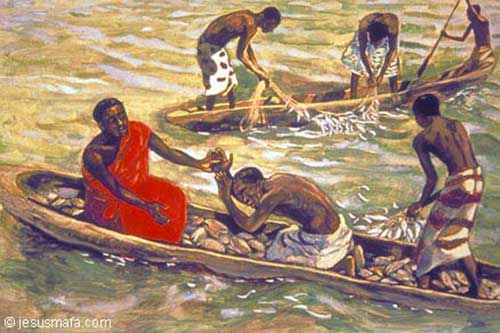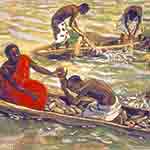
In last Sunday’s Gospel reading (Luke 5:1-11), fish were perfectly happy, swimming their happy fishy life, and then they are caught in half-cleaned nets, dragged to the shore and left, dead and dying, on abandoned boats in the late afternoon heat.
And Jesus seems to say: “follow me – what we did to those fish, that’s what we are going to do to people”!
A lot of Christianity appears to be like that. A lot of religion appears to be like that. Bad news.
You cross sea and land to make a single convert, and you make the new convert twice as fit for hell as you are yourselves.
And the solution by many – can you blame them – is to have no religion. I’m not, in this post, going to list the issues with having a religious vacuum, atheism, and so forth – a little knowledge of even relatively-recent history should suffice…
The solution that I think Jesus proposes to bad religion, unhealthy spirituality, to bad news is good news, healthy spirituality…
Lost in most translations of Sunday’s gospel is that Jesus isn’t saying: let’s turn happy people effectively into what we have done to these happy fish! In Luke’s Gospel, he is contrasting what was being done to the fish: From now on you will ζωγρῶν (zōgreō) fish. [In Greek word order doesn’t work as it does in English – changing the word order doesn’t change the underlying meaning; here, Luke ends the sentence with ζωγρῶν – giving it extra punch.]
ζωγρῶν is only used one other time in the New Testament 2 Tim 2:26 – to hold captive. ζωγρῶν has ζωή (zōḗ) at the heart of it – “life” (we use it, for example, in “zoology”, the study of life). There are different words in Greek for “life” (βῐ́ος – bios; ψυχή – psuche). ζωή (zōḗ) is about God’s inner life, divine life, eternal life.
I came that they may have life (ζωή – zōē), and have it abundantly. (John 10:10)
“The Glory of God is a human being fully alive.”
We are “catching” people to help to make them not less alive, but more alive.
*****
There’s plenty of other material in this reading from Luke to keep us occupied.
We so read one Gospel in the light of another, mixing them all up! Did the first community have those different ones?
Simon isn’t really introduced in Luke’s Gospel – we meet him suddenly when his mother in law is sick. So, for this reading to even make sense, we have to understand it is read within a verbal context. I have written previously that the written word is there within the framework of an oral tradition (eg. So Long Sola and Solo Scriptura).
In this fishing reading, Simon is suddenly, without explanation, called “Simon Peter” – that explanation only appears in Luke later (Luke 6:14).
There is no mention, in Luke, of Jesus’ job or trade – but the story only works well in the knowledge that Jesus wasn’t a fisherman. Peter’s eye-rolling at Jesus’ suggestion to lower those nets in the daytime makes sense only if Jesus wasn’t a fisherman. Had he been a fisherman, one can imagine that Jesus wouldn’t just have had Simon put out a little way from the shore – he might have taken control himself of the boat he commandeered.
If you appreciated this post, consider liking the liturgy facebook page, using the RSS feed, and/or signing up for a not-very-often email, …
Instagram’s @liturgy is the new venture – if you are on Instagram, please follow @liturgy.




Fish don’t have the capacity for happiness. Poor analogy.